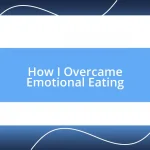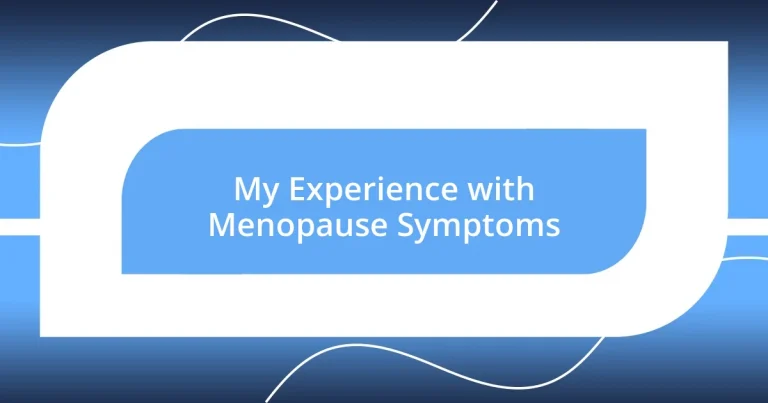Key takeaways:
- Menopause symptoms include physical changes like hot flashes, night sweats, and joint pain, alongside emotional challenges such as mood swings and anxiety.
- Lifestyle adjustments, including improving sleep hygiene, incorporating physical activity, and adopting a balanced diet, significantly helped in managing menopause symptoms.
- Seeking professional help and engaging with support groups can provide valuable guidance and community, making the menopause journey feel less isolating.
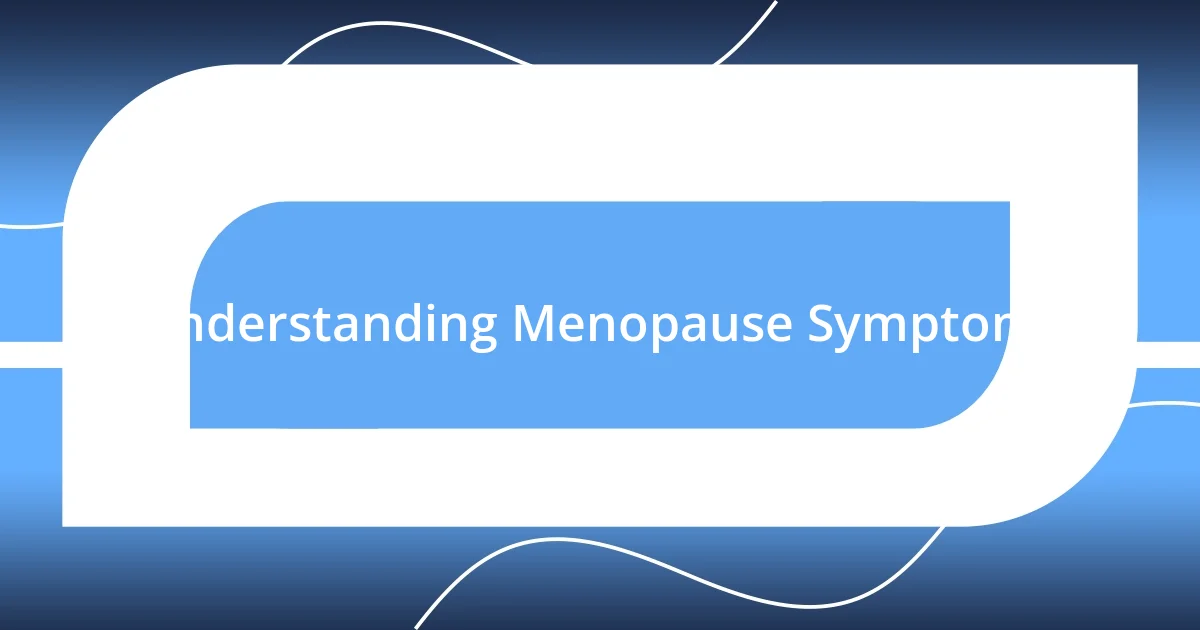
Understanding Menopause Symptoms
Menopause symptoms can feel like an unexpected rollercoaster ride. I remember waking up one morning drenched in sweat, utterly bewildered by the sudden night sweats that would disrupt my peaceful sleep. It’s as if my body decided to throw a surprise party, complete with heat waves and mood swings, leaving me to wonder—am I alone in this?
The emotional aspect of menopause can be just as intense as the physical symptoms. I often found myself teetering on an emotional tightrope, where one minute I was fine, and the next, I could burst into tears over a cute dog video. How could something so natural feel so overwhelming at times? This emotional shift is a common experience, as hormonal fluctuations play a significant role in our mood.
Then there’s the cognitive fog that sneaks in, making me feel like I’ve wandered into someone else’s brain. I’d catch myself forgetting names or misplacing my keys more often than I’d like to admit. It’s baffling, isn’t it? This “brain fog” adds to the challenges of navigating everyday life, ultimately leading to a deeper understanding of how menopause reshapes our identities and lives.
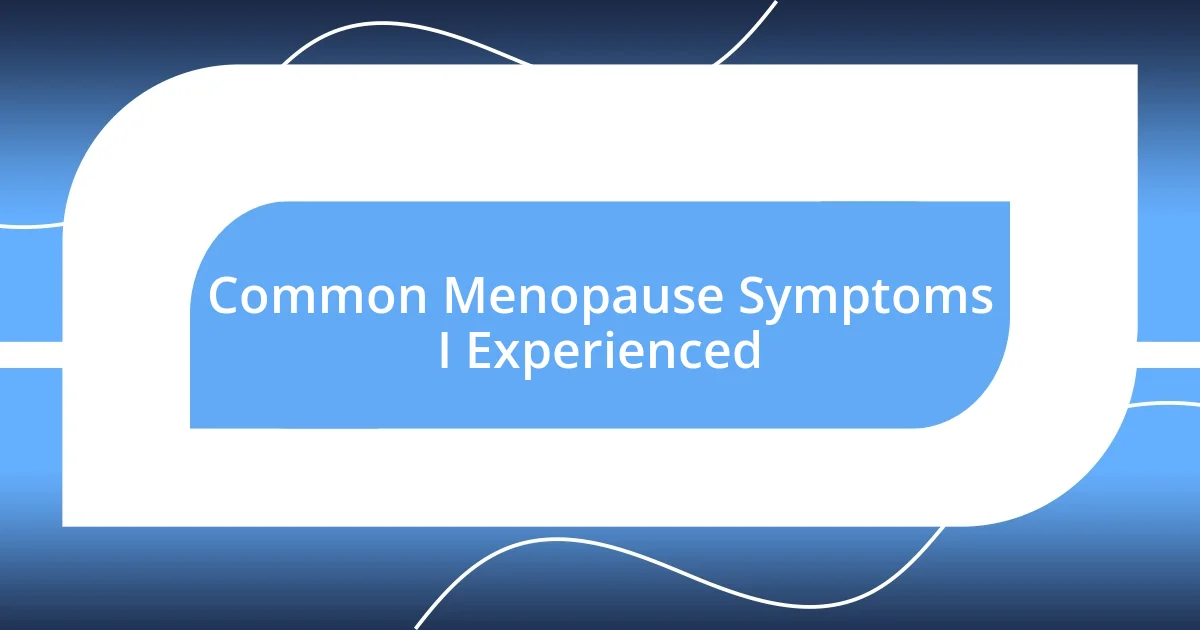
Common Menopause Symptoms I Experienced
Experiencing menopause symptoms can be a bewildering journey, and for me, the most prominent were the hot flashes. It felt like an internal furnace ignited at the most inconvenient times—like during a meeting or while simply browsing the grocery aisle. I vividly recall one instance at a friend’s dinner party when I suddenly felt engulfed by heat. I could sense the curious looks as I tried to discreetly fan myself with a napkin, yearning for a reprieve.
Night sweats also took center stage in my experience. I used to wake up in the middle of the night, drenched and gasping for fresh air, desperately kicking off the covers while my partner slept soundly beside me. It was frustrating, as I craved a good night’s sleep that evaded me during this phase. Have you ever felt that odd mix of annoyance and helplessness? I certainly did, and it pushed me to find ways to cope, like keeping my bedroom cool and breathable.
To my surprise, weight fluctuations became another common challenge. I didn’t just notice a shift on the scale; my clothes began to fit differently, and I could feel the extra weight settling in places I wasn’t used to. I remember trying on a pair of jeans that once felt perfect—only to discover I could barely zip them up! It’s an unsettling realization, one that leads many of us to reevaluate our approach to fitness and health during this time.
| Symptom | Experience |
|---|---|
| Hot Flashes | Like an internal furnace igniting unexpectedly. |
| Night Sweats | Waking up drenched, kicking off covers in a desperate heat wave. |
| Weight Fluctuations | Pants that once fit perfectly needing a serious adjustment. |
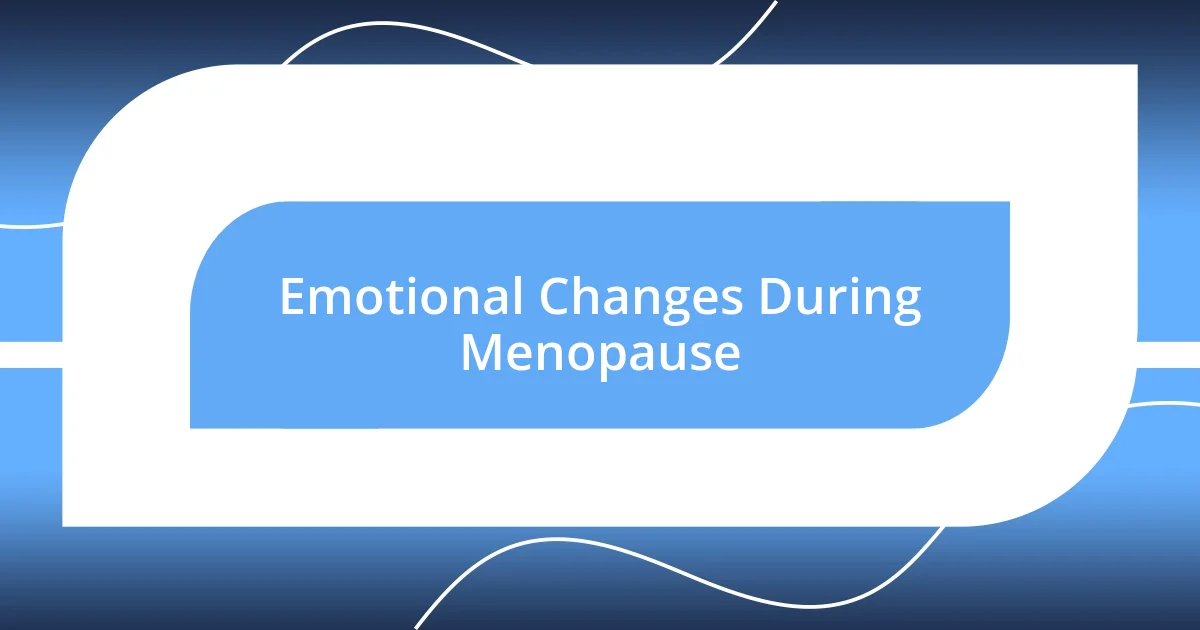
Emotional Changes During Menopause
One moment, I could be enjoying a quiet cup of tea, plotting my day, and then suddenly, out of nowhere, a surge of anxiety would wash over me. It felt like standing in a freezing rain despite being indoors. I remember one afternoon when I started second-guessing every decision I had recently made—should I have taken that job offer? Did I handle that conversation poorly? Those racing thoughts pulled me from my peaceful state into a whirlwind of self-doubt. It’s a powerful reminder of how menopause doesn’t just shift our bodies but also sends our emotions on a wild journey.
- Mood Swings: I found myself transitioning from laughter to tears within minutes, as if my emotions had a mind of their own.
- Anxiety: Some days, I would feel an overwhelming sense of dread creeping in without a clear trigger. It was unsettling and exhausting.
- Increased Irritability: Little annoyances would trigger a disproportionate reaction, making me feel like I was on high alert.
- Sense of Loss: There were days when I felt a tangible loss of my former self, which was difficult to reconcile with the changes I was experiencing.
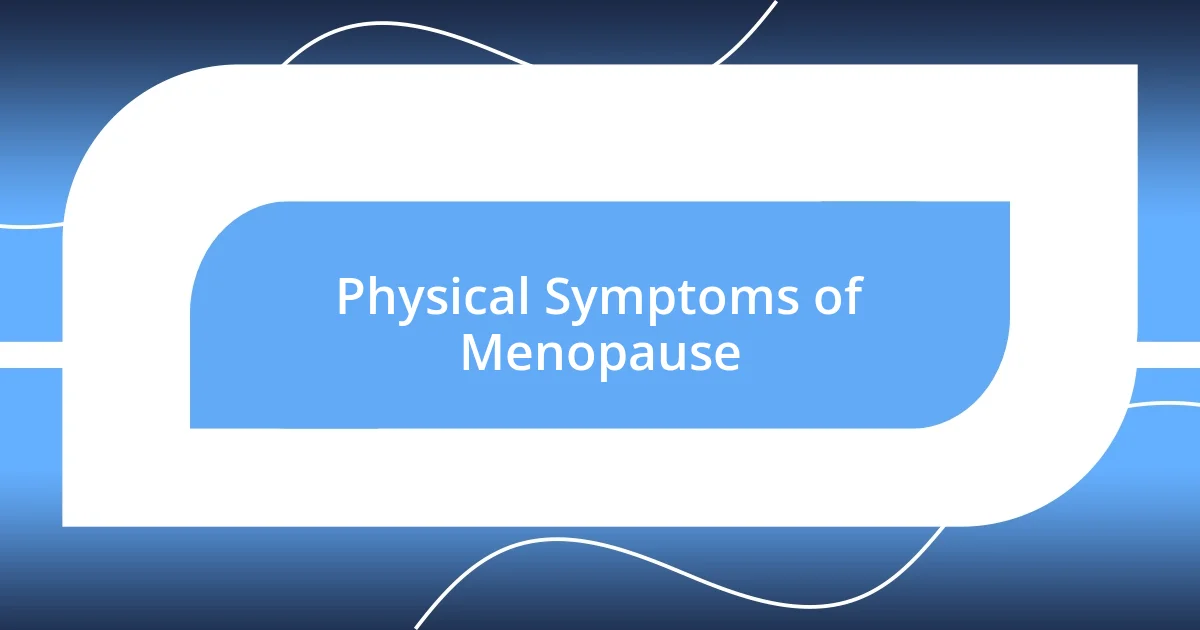
Physical Symptoms of Menopause
As I navigated through menopause, another physical symptom that stood out were the joint pains. Some mornings, I would wake up feeling like I’d run a marathon, my joints protesting every step I took. It led me to wonder—was this just aging or a direct consequence of hormonal shifts? I recall once struggling to lift a heavy grocery bag; I had to pause, feeling slightly defeated.
Skin changes also became glaringly obvious. I noticed my skin felt drier and less elastic, almost as if it was lacking its former vitality. I remember applying moisturizers generously, hoping to recapture a bit of that glow I once took for granted. Has anyone else felt like their skin was betraying them during this phase? It’s a tough realization, and it pushed me to experiment with products, looking for the right blend of hydration and nourishment.
Lastly, let’s not forget about headaches. There were times when I found myself battling dull, persistent discomfort that would linger throughout the day. I distinctly recall sitting at my desk, feeling the pressure build behind my temples while trying to focus on work. It raised an interesting question for me: how does menopause affect our overall quality of life? In those moments, I learned to appreciate the importance of staying hydrated and keeping stress levels in check, seeking natural remedies to ease that discomfort.

Lifestyle Changes That Helped Me
Adjusting my lifestyle during menopause was a pivotal step in managing my symptoms. I realized the power of a good night’s sleep, which seemed elusive at times. After countless nights of tossing and turning, I introduced a soothing bedtime routine. I remember lighting lavender candles and reading a few pages of a comforting novel; this simple change significantly improved my sleep quality. Who would have thought that a calming ritual could have such an impact?
Incorporating physical activity into my daily routine also became essential. I started with short, brisk walks in the morning, and soon it turned into my favorite part of the day. I clearly recall the feeling of fresh air filling my lungs, as each step eased my joint discomfort and lifted my spirits. It’s amazing how just moving my body—even a little—helped me pass through those emotional dips. Have you ever noticed how a walk can clear your mind and brighten your mood? For me, it was like a natural reset button.
Nutrition played a crucial role too. I began to embrace a balanced diet rich in whole foods, filled with vibrant veggies and wholesome grains. The shift was gradual but eye-opening. One afternoon, while preparing a colorful salad bursting with greens and nuts, I felt a surge of energy—something I hadn’t experienced in a while. Healthy eating transformed my energy levels and minimized those post-meal crashes. In those moments, I realized that what we feed our bodies is just as important as how we care for our minds. Have you tried changing your diet to see how it can impact your well-being? The results can be astonishing!
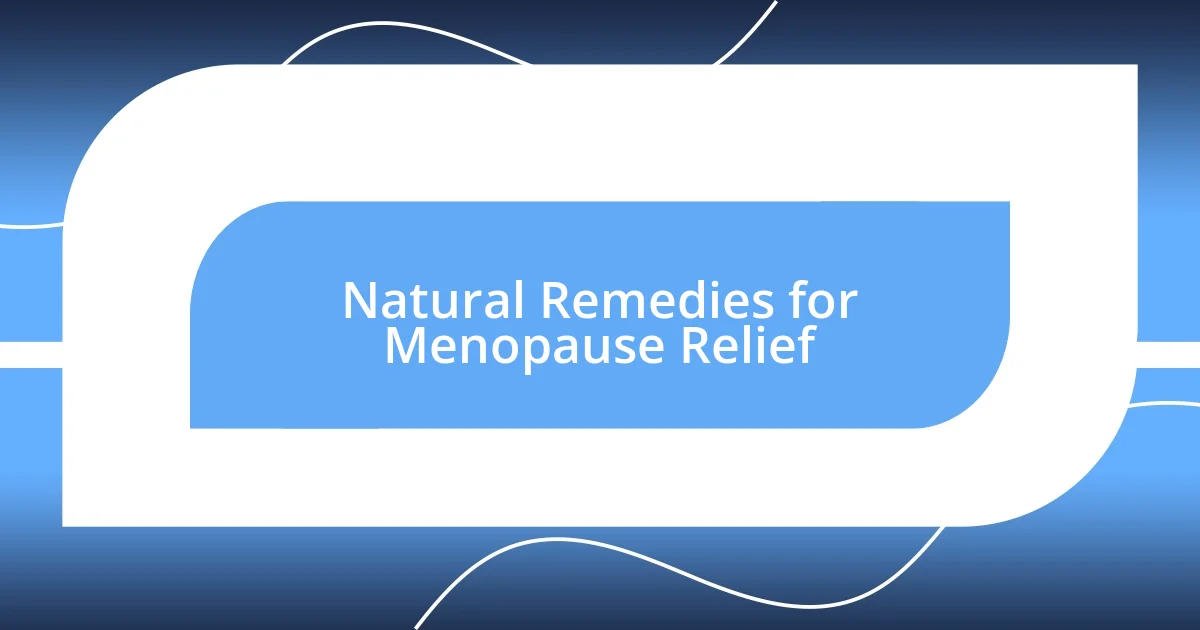
Natural Remedies for Menopause Relief
Exploring natural remedies for menopause relief has been quite the journey for me. One of my significant discoveries was herbal supplements, specifically black cohosh. Initially skeptical, I decided to give it a try after hearing about its potential to ease hot flashes. I vividly remember the first time I felt the subtle relief wash over me. I couldn’t help but wonder, had I stumbled upon the secret to reclaiming some comfort during this transition?
Another remedy that surprised me was acupuncture. I’ve always been curious about alternative therapies, so when a friend recommended it for hormonal balance, I had to give it a shot. Each needle felt like a tiny moment of calm; I looked forward to my sessions. There was something profoundly relaxing about lying there, and I started to realize how tension seemed to evaporate, almost like a fog lifting. Have you ever experienced that profound sense of relaxation that can only come from truly letting go?
Then there’s the power of essential oils. I began experimenting with lavender and peppermint to soothe irritability and headaches. I distinctly recall one evening, feeling particularly restless, when I diffused a few drops of lavender oil. As the calming scent enveloped me, I felt my worries dissipate, allowing me to breathe easier. Isn’t it fascinating how simple scents can bring us back to a place of peace and clarity? In those moments, I learned just how impactful these natural remedies could be in easing the tumultuous waves of menopause.

Seeking Professional Help for Menopause
Seeking professional help during menopause can be a game-changer. I remember the first time I walked into my doctor’s office feeling overwhelmed and unsure. I was greeted with kindness and understanding, which made it so much easier to open up about my struggles. Isn’t it comforting to know that you’re not alone in this journey? Discussing my symptoms with a healthcare provider not only validated my experiences but also opened the door to tailored solutions.
While I explored various treatments, I learned that professional guidance can help navigate the myriad options available—hormone therapy, lifestyle adjustments, or even referral to specialists. I was particularly struck by how personalized my treatment plan became after those initial conversations. The knowledge that my doctor was taking the time to listen to my unique experiences made a huge difference. Have you ever felt more at ease knowing someone was dedicated to helping you through a challenging time?
Additionally, support groups can offer invaluable insights. I found connecting with others who were experiencing similar symptoms to be incredibly uplifting. Sharing stories and coping strategies created a sense of community, reminding me that we’re all in this together. Being part of that supportive network not only reduced my feelings of isolation, but it also empowered me to seek professional help more confidently. Have you considered talking to someone who truly understands what you’re going through?






